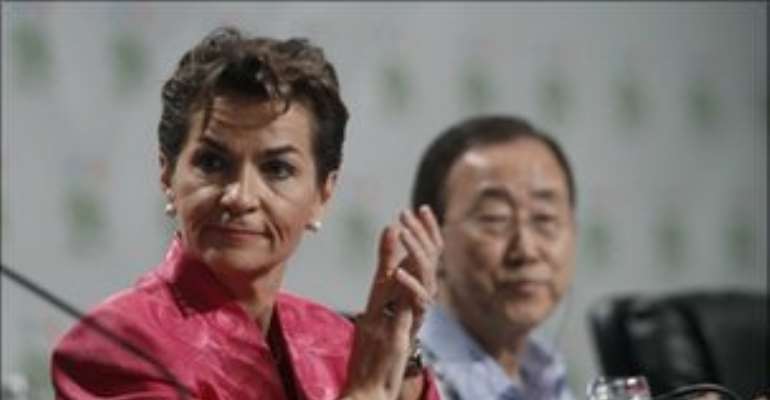CLIMATE CHANGE WARNING AT UN CANCUN SUMMIT

Top UN climate official Christiana Figueres said the fate of low-lying islands should be a 'wake-up call'
Ministers have begun talks at the UN climate summit in Cancun amid warnings that time is running out to curb climate change and save the UN process.
The top UN climate official, Christiana Figueres, said the fate of low-lying islands should be “a wake-up call”.
Big differences remain between nations on issues such as cutting emissions, protecting from climate impacts, and inspections of others' emission curbs.
It is unclear whether those issues can be resolved in the three days left.
Mexican President Felipe Calderon congratulated negotiators for their work so far.
“The work has been difficult but I see the results of negotiations are encouraging, although it is clear there are formidable challenges to overcome,” he said in his opening speech.
“What should prevail is goodwill, trust and understanding and with that we will be able to offer the world an opportunity to open a new path when it comes to fighting climate change.”
UN Secretary-General Ban Ki-moon warned delegates they must be prepared to compromise rather than searching for the deal that they ideally wanted.
“We cannot have the perfect be the enemy of the good,” he said.
“Business as usual cannot be tolerated, for it would condemn millions – no, billions – of children, women and men around the world to shrinking horizons and smaller futures.”
Naked truth
It is universally acknowledged that this summit will not produce a grand, comprehensive climate deal with legal status, as was the hope for Copenhagen.
Instead, ministers are hoping to move far enough to regenerate confidence in the process, and keep the option of achieving a legally-binding deal alive.
Ms Figueres, the Costa Rican diplomat who took up the post of UN climate convention (UNFCCC) executive secretary earlier this year, warned that the stakes at this conference were high.
“The political stakes are high because the effectiveness and credibility of your intergovernmental, multilateral process are in danger,” she said.
CANCUN CLIMATE SUMMIT
Climate talks see compromise mood
Hot and cold oil in Cancun climate
Poorer nations 'need carbon cuts'
Can 'Terrific ten' save the world?
“And the environmental stakes are high because we are quickly running out of time to safeguard our future.
“Tuvalu, The Maldives, Kiribati, Vanuatu are looking for ways of evacuating their entire populations because of salt water intrusion and sea level rise Their fate is a wake-up call to all of us.”
Earlier, the UN Environment Programme (Unep) formally presented delegates with the results of a study published two weeks ago, showing that pledges on the table for curbing emissions will not be enough to keep the global average temperature rise below the levels that most governments say they want.
The vast majority of countries want to keep the rise since pre-industrial times to within either 1.5C or 2C.
Lou Leonard from environmental group WWF was one of many campaigners emphasising that the agreement coming out of here must allow for countries to increase their pledges, to close this gap.
“They say they want 2C, the pledges don't get to 2C It is like the emperor has no clothes,” he said.
Withering away
To facilitate compromise, the Mexican hosts have asked five pairs of ministers – one from a developing country and one from a developed country in each case – to explore particularly difficult areas.
These span emission cuts, adaptation to climate impact, the transfer of technology and money from rich to poor, and – perhaps toughest of all – the future of the Kyoto Protocol.
Japan said at the start of this meeting that it will not accept further emission cuts under the protocol. That opposition is backed by Canada and Russia.
But developing countries are adamant that the protocol must continue.
“The Kyoto Protocol represents part of the bargains struck earlier,” said Dessima Williams, Grenada's UN Ambassador, speaking for the Alliance of Small Island States (Aosis).
“Therefore honouring it is a signal of reliability and trust in international negotiations That is very important in a context in which we have historically not had promises made to us kept.
“Also, we believe it does capture the historical responsibility of those who are responsible for the mess we are in.”
The task of finding compromise between these apparently implacably opposed positions falls to UK Climate Secretary Chris Huhne and Brazilian Environment Minister Izabella Teixeira.
It appears, however, that Mr Huhne may have to fly back to London on Wednesday evening to take part in Thursday's vote in the House of Commons on university tuition fees.
That, according to the charity Oxfam, could have “a significantly negative impact on the process”.
Mr Huhne agreed that the stakes were high. Without movement here, he suggested, some governments would downgrade the importance they placed on the UN convention and its potential to deliver a meaningful climate pact.
“What worries me is that there will be countries that say the game here, this particular forum, isn't worth a candle,” he told BBC News.
“It will peter out, it won't vanish. People next year won't send a senior minister, they will send a junior minister, and then the year after they will send a senior civil servant. In a few years' time it will be the local ambassador, and it will wither on the vine.
“That's not what we want here. We want a sense that there is renewed momentum so people are coming back next year with a real sense they want to reach a deal.”
